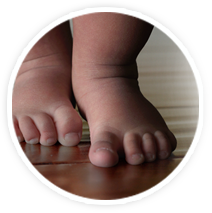Services are free!
Regardless of:
The Individuals with Disabilities Education Act (IDEA) ensures that intervention services are provided to young children with developmental delays. Help Me Grow resources help parents and professionals identify young children who would benefit from these services.
Minnesota’s Help Me Grow initiative provides information and resources that will help parents, professionals, and community members identify children who may be experiencing delays in their development. Help me Grow provides information that will equip those who interact with young children (birth to kindergarten) to better monitor each child’s development. When developmental concerns arise, individuals are encouraged to make a referral online at www.helpmegrowmn.org or by calling 1-866-693-GROW (4769). Eligible children and their families receive high quality infant/toddler intervention or preschool special education services from local qualified professionals.
IDEA stands for The Individuals with Disabilities Education Act. IDEA ensures that intervention services are provided to young children with developmental delays. Help Me Grow is part of Minnesota’s statewide intervention system under IDEA. The Help Me Grow initiative provides information for families, early childhood care and education providers, and health care professionals in order to identify children who may benefit from these services.
Infant and Toddler Intervention services, including a statewide child find system, are included in the federal law, IDEA.
All primary referral sources are required to refer an infant or toddler through Help Me Grow as soon as possible but in no case more than seven days after a developmental concerns has been identified. There are also specific requirements for referring a child under the age of three who is the substantiated case of child abuse or neglect or who is identified as directly affected by illegal substance abuse or withdrawal symptoms resulting from prenatal drug exposure. (CFR 34 §303.303)
Primary referral sources include:
Preschool Special Education services are also included in the federal law, IDEA.

If you have concerns about a child's development and think a child might need extra help to learn and grow, don't hesitate to refer a child.
The family will be contacted by the local school district to arrange for a screening or evaluation to determine if their child is eligible for Infant and Toddler Intervention or Preschool Special Education services in Minnesota.
Services are free!
Regardless of:
